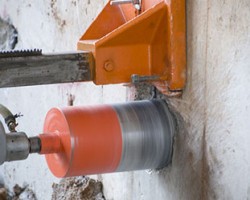What output quality do you want from your drilling project? Your answer to this question will help determine what kind of drill bit to use.
Here are the two most common user requirements:
a) Material hole
– Drilling tasks in most cases involve creating a round and even hole. For such applications, you should use either a hollow or a solid drill. Hollow drills can be quite fast and efficient. The primary application for solid drills is in drilling primary holes in the range of .001” to 3/8”. On the other hand, hollow core drills are for drilling larger holes.
b) Obtaining material plug– Obtaining a material core is often the main reason for using diamond core drills. For this purpose, hollow drills offer the best results. The inner diameter of the core drill plays a critical role in such cases. Manufacturers take special care in developing drills with differing tolerances and specifications.
Aside from these two major requirements, there are other less common ones:
Finish or chipping requirements– The grit or mesh size of the diamond drill determines the finish quality of the surface, chipping level, microstructure deformation or damage of material, and smoothness.
In situations where chipping and surface finish are a critical factor, the perfect tool would be a metal bond, sintered diamond drill with very fine grit.
For getting the highest surface finish quality, you should use electroplated multi-layered core drills with a swivel water adapter running a high-pressure coolant. Water-soluble synthetic coolants offer the best surface finish results.
Cost of material– When the material drilled is expensive, valuable or precious, the associated drilling costs take a backseat.
Use thin walled drills to minimize deformation and loss of material. However, when it comes to cost of materials it is necessary to have a prior estimate of the target cost versus the quality of the resulting job.
Tolerances– To work with materials with specific tolerances you will need custom drills that are designed for very specific tasks.
Specification of tolerances may depend upon concentricity, run out, OD, and ID of diamond drills.
Use of coolant
Did you know that different drills have different coolant requirements? If you’re using a core diamond drill, use a coolant for the best results.
Regular drilling projects can use tap water, mineral oils, or a water-soluble synthetic coolant.
Using a drill dry will most certainly result in shorter drill life and the deformation of the material being drilled.
Nickel bonded electroplated drills are often used for dry drilling even if this is not the recommended method.

